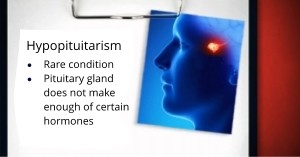Hypopituitarism Newport Beach & Orange County, CA
Hypopituitarism Treatment Orange County
 Hypopituitarism is a rare condition in which your pituitary gland doesn’t make enough of certain hormones. The body cannot function properly when important glands don’t get the hormones they need from your pituitary gland.
Hypopituitarism is a rare condition in which your pituitary gland doesn’t make enough of certain hormones. The body cannot function properly when important glands don’t get the hormones they need from your pituitary gland.
- Pituitary tumor
- Hemochromatosis (a hereditary disease characterized by too much iron in the body)
- Stroke
- Traumatic brain injury due to accident
- Severe bleeding in the brain
- Tuberculosis or meningitis
- Lymphocytic hypophysitis (inflammation of the pituitary gland)
- Blood loss during childbirth
- Damaged pituitary gland from radiation or chemotherapy
- Certain conditions present in childbirth
Growth Hormone Deficiency
- Short stature if the pituitary does not produce enough growth hormone
- Problem with sexual development
Thyroid Hormone Deficiency
- Nausea, headache, and vomiting
- Decreased energy
- Increased need to sleep
- Sensitivity to cold
- Dry skin
- Constipation
- Muscle weakness or aches
- Stiffness in the joints
- Weight loss or weight gain
- Decreased mental capacity
Luteinizing Hormone and Follicle-Stimulating Hormone Deficiencies
- Infertility (women)
- Impotence (men)
- Decreased vaginal secretions
- Decreased ejaculate volume
- Menstrual irregularities or absence of periods (amenorrhea)
- Decreased sex drive
- Osteoporosis
- Loss of body/facial hair
- Weakness or fatigue
- Anemia
Antidiuretic Hormone Deficiency
- Excessive thirst
- Frequent/uncontrollable urination
Once Dr. Louis has determined which hormone levels are low, he will check the affected parts of the body. Sometimes, the problem is not with the pituitary gland, but with the other target organs.
Imaging tests, such as computed tomography (CT) scan or magnetic resonance imaging (MRI) scan of your brain, are required to determine if a tumor on your pituitary gland is affecting its function.
Minimally Invasive Endoscopic Transsphenoidal Surgery
Orange County neurosurgeon Robert Louis, MD, specializes in minimally invasive endoscopic transsphenoidal surgery for the treatment of hypopituitarism. This sophisticated procedure removes the tumor while minimizing complications, hospital time, trauma, and discomfort. Dr, Louis has the specialized skills and training with this advanced technique. Read more about Endoscopic Transsphenoidal Surgery.
Hormone Replacement Medicines
Hormone replacement medications are prescribed to replace the deficient hormones at a level that is as close to physiologically correct as possible and relieve the symptoms of hypopituitarism. It often takes time and repeated dose changes to find the optimal dose for each patient. Once the optimal dose is determined, the dose remains adequate for long-term treatment. Replacement therapies include Levothyroxine given daily for thyroid hormone deficiency; estrogen, progesterone, and testosterone for sex-related hormone deficiencies; prednisone or cortisol for cortisol hormone deficiency.
Robert Louis, MD, a fellowship-trained Orange County Neurosurgeon, is the Director of the Skull Base and Pituitary Tumor Program at Hoag Memorial Hospital in Orange County, California. Dr. Louis has particular expertise in the endoscopic and minimally invasive treatment of benign and malignant brain tumors, sellar and parasellar tumors, and skull base tumors.
Dr. Robert Louis specializes in minimally invasive endoscopic transsphenoidal surgery for the removal of pituitary tumors. For appointments, please call (949) 383-4185 or Contact Us.



